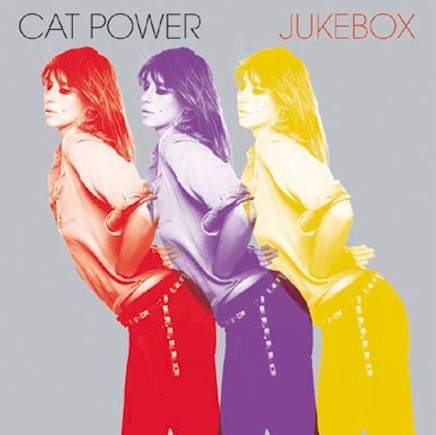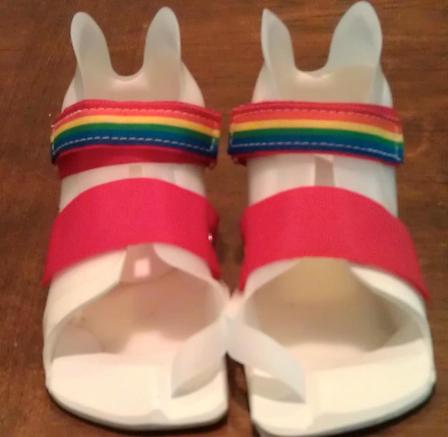I have cerebral palsy. That means something different for all of us: some of us walk with braces; some walk without anything; some use wheelchairs; some have hands, feet, and faces that do their own thing; some stand on their toes; some communicate verbally; some don’t. Personally, I walk like this:

And I wear these:

(My orthotist gave a knowing look when I finally requested the “rainbow” swatch.)
I don’t exactly pass as able-bodied. Most people know something is “off” as soon as I stand up (as one college professor not-so-gracefully put it, “I looked at you and went ‘hmmm‘”). But sitting down, almost no one can tell, so I inhabit a middle space that confuses people all across the ability spectrum. People with CP have literally asked where mine is, as if it can be located. It’s true that I lack many of CP’s obvious markers, and aside from stairs without handrails and clawfoot bathtubs (seriously, why?), I don’t have to battle many physical barriers. But literally walking the line between able-bodied and not has given me an up close look at how people think about disabilities, and I will say this: if you’re not able-bodied, it’s really hard to get people to take you seriously.
They will tell you how brave and inspirational you are, for sure (which, of course, is more about them than you). They’ll tell you God loves you extra. Bonus points if they are also crying. But they’re uncomfortable, on some level, with you making your own choices — especially if those choices might have painful outcomes. Everyone around you will manicure your life so that you don’t have to experience difficulty. Things will happen around you rather than to you. Risk taking isn’t presented as an option. There are a couple different assumptions at work here: first, that you’ve already been through so much that you deserve the gold star of a decision-free life, and second, that you are a child in need of constant protection. That becomes a self-fulfilling prophecy: when everyone takes care of you, it’s damn near impossible to grow up.
When I talk about these issues with straight people, I always say “the other difficult thing to do when you have a disability is get somebody to fuck you.” They laugh, I laugh, and we can all move on without really pausing to examine why that is. But since we’re all inside the amazing feelings cocoon that is Autostraddle, I’ll admit that’s not the whole truth. Yes, sex with a disability is a tough sell, but not (just) for the reasons people assume. In my experience, the hardest part isn’t convincing someone else you’re desirable — it’s convincing yourself that your body is worth pleasing.
Anyone who’s come out, if only to herself, knows a similar feeling: acknowledging that your desires are valid even though they’re not the ones you were “supposed” to have. When I came out in high school, I knocked cerebral palsy to the furthest psychological backburner possible. Now I had a new “thing” to focus on — and one that people around me, even if they didn’t understand it, had at least heard of before. I was the only physically disabled person at our school who wasn’t also in special ed, but there had been other out gay people there before I came along and there would be more afterward. I was no longer by myself. It didn’t feel as lonely. And unlike with disability, there was a prescribed narrative for how to deal with it, which I obviously embraced to a T: I announced my gayness during a Gay-Straight Alliance Meeting and was promptly elected club president for the following school year. It doesn’t get much more Coming Out 101 than that.
I compartmentalized my disability and my sexuality like it was my job until after college. Then I realized I wanted to actually have sex instead of just picking it apart in sociology class. So, like any self-respecting queer lady, I turned to the internet — and met Alex.
In her first message, she admitted she was in the bathtub, drinking wine to keep her courage up. In retrospect, bathtub computering is probably a bit of a red flag, but what impressed me at the time was her complete honesty about being nervous. It made me feel safe, like I could be too, and that’s exactly what I needed. I wasn’t sure what else would happen, but looking across the table on our first date, I knew: you are the first person I’ll sleep with.
First time stories are always fun/mortifying, but that’s not the one I want to tell you, because that’s not the one that woke me up to the fact that my disability and sexuality have to breathe the same air. That happened about a month later, when Alex rolled over in bed and asked:
“So… how do you feel about bondage-y things?”
Remember for a moment that I had just gotten used to having sex at all. So my initial reaction was along the lines of UM WHAT I HAVE NO IDEA CAN I PHONE A FRIEND. But beneath that, I asked myself something else: how often are people this open about what they want? I wanted to please her, but was also interested to see what this would mean for me and for my body. It’s not often people invite me to take physical risks. So I agreed to try it.
And then… nothing.
I braced myself for the start of our little experiment, but things unfolded pretty much the same way as before. The delight of never knowing quickly gave way to frustration. I suspected why, but didn’t want to believe it. Sure enough, when I finally asked, I got the answer I had feared: “I’m afraid I’m going to hurt you.”
What that said to me was, “this woman still thinks I’m a little girl.”
Up to that point, I thought I’d done everything “right”: cultivated a functional relationship, finally let someone see me with my clothes off, said yes to sex, talked about my body, listened about hers, been willing to try new things, behaved like an adult. But it turns out it hadn’t worked. All of a sudden, the “nice girl” formula that had made my disability palatable — acknowledge, but don’t dissect; laugh it off when things get tough — failed. I had literally done the most grown-up thing I could think of with this person, and she still saw me as vulnerable. Not in the way that brings people closer, mind you, but in the way that makes them afraid to touch you. Makes them think you’re breakable.
Instead of screaming in her face, which is what I really wanted, I turned her question back on her and asked: “Who’s better at pain than I am?”
As a way to get a grasp on the whole CP situation, people like to ask me, “does it hurt?” In pain/not in pain is a good/bad binary that they can digest. It allows them to categorize my body in a way that makes sense, and tells them whether they should feel bad for me or not. I always say no because I don’t want to give anyone (more) reason to look down on my body. But let’s be real — there are screws in my spine. Of course it hurts. There’s at least an unpleasant twinge happening somewhere all the time. So what people should really be asking is whether the pain is Old or New.
Old Pain I’m used to: the tightness in my hips when I don’t stretch in the morning, the pressure where my legs meet my back when I walk too far. It’s not that I don’t feel it; it’s just been there for so long that I know not to get nervous about it anymore. New Pain is where it gets scary because it stops having a name. I can’t immediately catalog it or diagnose it as benign. At best, disability allows you to create a tenuous peace with your body, and anytime it decides to violate that mutual agreement can be terrifying. You take the time to figure it out — what it likes and dislikes, where it functions best — and stick to that routine, until New Pain reminds you that you’re never quite going to have this figured out.
The upside, though, is that I can handle pain like a pro. It’s easier for my body to feel pain than to feel good. Now, maybe I could have both.
The next time we had sex, Alex said, “close your eyes — I want to try something.”
I did, but it didn’t matter much, because she tied a blindfold around my eyes first thing. Then I felt my hands go up behind my head, and heard a click, click. I didn’t expect handcuffs on the first try, but there they were. And then I felt the first pinch — right on my nipple. And then another on the other side.
“Is this okay?”
“Keep going.”
I never asked her to stop, which is a shame, because our safeword was dinosaur and I still think that’s amazing. But alas, there was no dinosaur, and when she took the blindfold off, I saw that my chest was covered in clothespins. (When you’re in your twenties, nipple clamps are expensive, so you work with what you have.) I’d never seen my body look like that. She must have been pretty impressed, because the first thing she said was, “I’ve never been able to do that before. Nobody has been able to take that many.”
It’s not often (i.e., almost never) that I get told I’m good at a physical activity. But now my body, which had spent so many years letting me down and making decisions without my consent, had gone and done something absolutely right — and done it better. It had done something other people’s bodies, “healthy” bodies, hadn’t been able to.
So often we’re told that the “right” partner will “look past” our disability or “love us anyway,” like they’re on some sort of humanitarian mission. In that moment, I realized what complete and utter bullshit that idea is. The problem is not our bodies — it’s the misguided assumptions people project onto them. That we shouldn’t want them. That we don’t know how to use them. That they need to be cured. That’s what I want the people in my life — friends, family, girlfriends — to look past. I don’t want them to look past me. My disability is essential to my body. It’s a tough belief to stick to, and one that requires constant reinforcement, but it’s the truth.
Any woman can tell you an epic saga about her experiences with body shame, and a disability just compounds that, because so much talk is focused on what your body will never be able to do. You barely ever see any bodies that look like yours, especially outside a doctor’s office. And when you do, they’re never beautiful, they’re apologized for. But that night, I realized that my pain tolerance and the things my body did well were assets rather than things to be run from or ashamed of. To know that what had been perceived (especially by me) as defective about my body was actually what made me desirable, powerful and sexy for the first time ever — that moment was beautiful.





